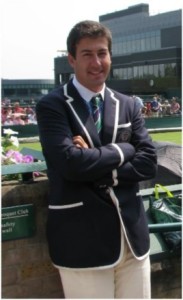
An Iranian tennis referee who was invited to work at the prestigious US Open tennis tournament has now been told he can’t work there.
The New York Times reported last Thursday that Adel Borghei, 32, was bumped from the tournament because US sanctions wouldn’t allow him to work at the US Open.
The Islamic Republic has played up the rejection, portraying it as one more example of America’s hatred for Iranians and one of many examples of how sanctions hurt the little man in Iran.
But, actually, sanctions had nothing to do with Borghei’s rejection. The problem was that he came to the United States on a visitor’s visa and no one with a visitor’s visit is allowed to work in the United States, regardless of their nationality.
Tens of thousands of Iranians without US citizenship work in the United States. Those on immigrant visas, green card holders, refugees and asylees can all work. Those on student visas can work, although not full time.
But the US Tennis Association was itself confused about US law. An email sent on behalf of Rich Kaufman, the director of officials for the US Tennis Association, said “current United States law” prohibited the open from “retaining the services of a resident of Iran.” The email included an apology and expressed the hope that Borghei could work at a future US Open.
It was the US Tennis Association that invited Borghei to be a referee at the Open this year in recognition of his skills as a referee and his international experience.
Borghei told The New York Times he has refereed or umpired tennis tournaments in more than 30 countries, including seven Wimbledon events.
In an interview with the Times, Borghei said, “This should not be about politics. That’s what I have a problem here with. I don’t want to talk about politics. But they’re mixing up politics and sports.”
Many Iranian sportsmen, however, come to the United States to compete. The Iranian national wrestling team was just in the United States a few weeks ago.
But Borghei was not coming to compete for a medal, but to work for pay. And that is where he ran up against the law. He would need a special visa allowing temporary employment. Iran musicians who come to the United States to perform and receive ticket revenues require such visas. They receive them although artists from all around the world, not just Iran, have complained that the bureaucratic process has become much more burdensome since 9/11.
Basketball players Hamed Haddadi and Arsalan Kazemi also require such visas. Haddadi had a visa problem a few years ago that delayed his arrival one season and caused him to miss a few games.
Borghei left Iran several weeks ago and worked a number of tournaments in other countries, including Canada, before arriving in the United States. He is now visiting with a friend in Florida.
A US Treasury Department spokesman told the Times that the US Open could employ an Iranian referee who entered the United States with the type of visa issued for “athletes, artists and entertainers.”
But the two-week Open started Monday and the bureaucratic hurdles to change his visa would be difficult to compete in time for him to referee this year.
It isn’t clear why Borghei sought a visitor’s visa. Presumably, the US Open employs many foreign referees and should tell them what visa they need to obtain to work at the Open.
But there is one problem with sanctions. The US Open couldn’t send Borghei’s paycheck to Iran. It would have to pay the money into an account in the United States.
Borghei remains miffed. “If all I cared about was the money, I wouldn’t come here,” he told the Times. I want to be in this tournament. I want to live the dream. This isn’t about money or politics. It’s about tennis.”
In Iran, PressTV, the English outlet of state broadcasting, said Borghei had been barred from the Open “under the pretext of sanctions.”
The Islamic Republic News Agency (IRNA), the state-owned news agency, quoted Majid Shayesteh, head of Iran’s Tennis Federation, as saying the US action makes clear the hostile American policies on Iran. “We don’t expect anything more from the United States,” IRNA quoted him as saying.
